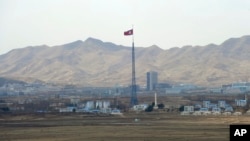Eleven North Korean defectors detained in Vietnam are asking the South Korean government to provide asylum in Seoul so they can avoid being deported to North Korea, according to a South Korean activist group.
Peter Jung, head of Justice for North Korea, a human rights group based in Seoul, told VOA’s Korean Service that one of the defectors who had a cellphone contacted the South Korean Embassy in Vietnam asking for help.
“The embassy told them it will take appropriate measures to help them,” said Jung. “But the defectors have not heard from the embassy" since Friday.
Eight women ranging in age from early 20s to 50s, and three men in their 20s crossed the Chinese border into Vietnam on Nov. 23. Vietnamese border guards detained them two days later in the city of Lang Son.
The defectors faced repatriation to North Korea. After several of the women fainted, the Vietnamese government decided against forcibly sending them to China, according to Jung. Currently, Vietnam is detaining all the defectors.
“Please take us,” said one of the women, pleading to the South Korean government in a video clip Jung sent to VOA.
In a separate video clip sent by Jung, another woman who was nursing people who appeared to be ill, said, “We are fleeing with patients like this. Please help us.”
The South Korean Foreign Ministry told VOA it is aware of the asylum-seekers.
“We are working and negotiating with the relevant country (Vietnam),” said a South Korean Ministry spokesperson.
VOA tried to contact the Vietnamese Foreign Ministry for comment but received no response.
If the 11 defectors are sent to China, they would most likely be deported back to North Korea, where they could face severe punishment such as forced labor, torture and even execution. China has a history of repatriating North Korean defectors.
North Koreans seeking asylum in South Korea often cross North Korea’s northern border into China. From China, they travel to a third country to enter South Korea because China expanded its crackdown of North Korean defectors earlier this year.
In April, Vietnam sent three North Korean defectors who crossed the Chinese border into Vietnam back to China.
Greg Scarlatoiu, executive director of the Committee for Human Rights in North Korea, said China should not send North Korean defectors home.
“If you take a look at the ‘Report of the U.N.’s Commission of Inquiry on Human Rights in North Korea,’ North Korean defectors can be tortured and executed” by their government, he said.
China joined the United Nations' 1951 Refugee Convention and its 1967 Protocol in 1982, which defines the rights of a refugee, as well as the responsibilities of countries that provide asylum.
China, however, does not follow the U.N.’s definition of a refugee and does not recognize North Korean defectors as refugees but as illegal economic migrants.
The estimated number of North Korean refugees in China range from approximately 30,000 to 50,000, according to the Committee for Human Rights in North Korea.
About 771 North Korean defectors entered South Korea this year as of September. There are 33,000 North Korean defectors living in South Korea, according to the South’s Unification Ministry, which handles relations with the North.
Christy Lee contributed to this report which originated on VOA’s Korean Service.





